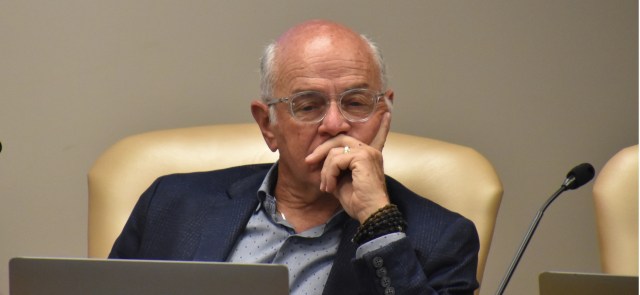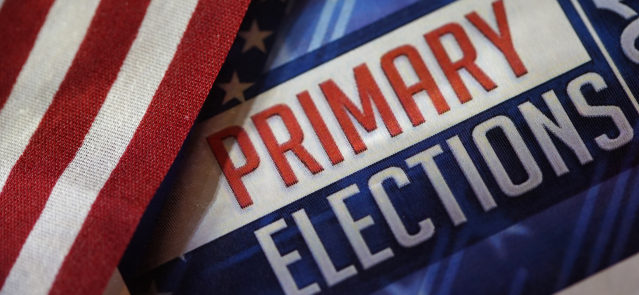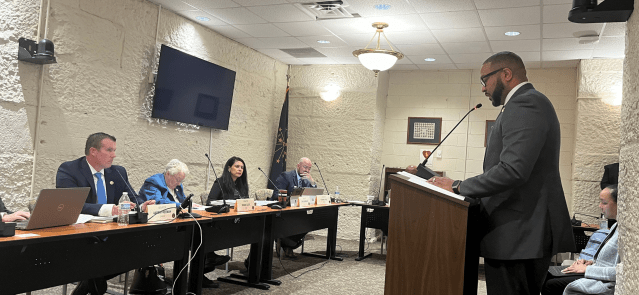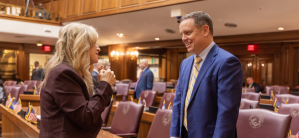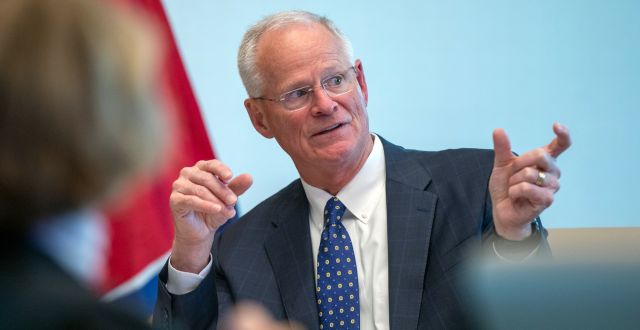The Kansas State Board of Education on Tuesday received an introductory overview of the newly minted task force formed to study students’ cellphone usage during class time.
Education Commissioner Randy Watson previously asked for a 30-member “blue ribbon” committee, but board members were informed during their meeting that the task force will comprise 36 members.
The committee is slated to meet Thursdays from 4 to 5:30 p.m., with six total meetings planned, beginning Aug. 22. Additionally, meetings will be publicly viewable via Zoom, and the committee will have a website and email address for questions and general feedback.
The committee plans to concentrate on three primary topics: personal devices in school, parental oversight of district-issued devices, and screen time and mental health.
“One of the hardest things about this is that technology is in every corner of our lives, so we’re narrowing the focus to those sub-areas,” said Jake Steel, education strategist for the Kansas State Department of Education.
As part of the process, committee members are asked to study the book “The Anxious Generation: How the Great Rewiring of Childhood Is Causing an Epidemic of Mental Illness,” which explores youth mental health in the era of smartphones, social media and big tech.
Calls for cellphone ban
Debate on the topic is picking up steam throughout the state. Ahead of students’ return to the classroom this week, the Lawrence school board heard from a proponent of the stricter cellphone policies.
The board was apprised of a petition with over 100 signatures calling for a strict district-wide ban of cellphones in classrooms. Justin Blumenstiel, a University of Kansas professor and parent of a Lawrence Free State High School student, described a perceived rise in cellphone usage negatively impacting students’ mental health. He traced the evolution to the advent of smartphones in 2007, followed by the emergence of Instagram on smartphones in 2010.
“Major depression, especially in teenage girls, has increased dramatically since 2010,” said Blumenstiel, adding that it’s a global epidemic. “The amount of depression in U.K. girls has increased as a function of how much time they spend on their smartphones.
“Across the entire world, loneliness is increasing in schools.”
But Blumenstiel also noted that correlation does not necessarily equal causation. He said districts that have implemented or promoted cellphone “interventions” resulted in positive outcomes in students’ mental health due to a marked decrease in anxiety levels.
Committee breakdown
The task force was designed to have equitable representation among K-12 school districts and other related job professions across the state.
The committee is composed of:
- Superintendents: Travis Githens, Cherryvale; Brian Huff, Gardner Edgerton; Brad Kempf, Jefferson County North; Troy Pitsch, Wabaunsee; Tonya Merrigan, Blue Valley
- Principals: Eric Hofer–Holdeman, Wichita Public Schools; Brian Houghton, Fredonia; Kathleen Brennan, Fort Riley Middle School; John Niehues, Greeley County; Kamiel Evans, Jefferson Elementary School
- Teachers: Tawna Hall, Derby Public Schools; José Martínez, Wichita Public Schools; Carol Budde, Newton Schools; Anna Luke, Beloit Junior-Senior High School; Connie Martin, Shawnee Mission South High School
- Students: Jessica Claire, Leavenworth High School; Ananya Agrawal, Blue Valley West High School; Ava Gustin, Mission Valley High School; Lane Lamping, Basehor-Linwood High School; Alexa Hernandez, Dodge City High School
- Parents: Amy Warren, Wichita; Kim Whitman, Shawnee Mission; Erika Sheets, Blue Valley Northwest High School; Korin Poppe, Republic County Unified School District 109; Lori Barnes, Arkansas City
- Local school board members: Sue Bolley, Topeka Public Schools; Jackie Gigot, Garden City Public Schools; Katie Allen, Manhattan-Ogden Public Schools; Laura Corey, Hutchinson Public Schools; Trisha Moritz, Attica Public Schools
- IT staff: Travis True, Topeka Public Schools; Lyndsay Noble, Rockhurst University
- Legislators: Rep. Scott Hill, R-Abilene; Sen. Chase Blasi, R-Wichita
- State board of education members: Melanie Haas, District 2; Danny Zeck, District 1
Board member Jim McNiece, District 10, told State Affairs he was pleased with the composition of the committee.
“There are a lot of people with a stake in the pie,” he said. “What you don’t want to do is leave people out.”
Having spent nearly three decades as a high school principal, McNiece said he’s unsure if there will ever be a comprehensive answer to cellphone usage in classrooms.
“It has certainly gone in a different direction than I ever imagined,” he said, “when you have mothers that want to make sure they’re in contact with their kids all the time.”
The issue, McNiece said, extends beyond students and K-12 classrooms.
“I talk to my friends who are in business and they’re facing the same problem: ‘How do I keep my people off these communication devices?’” he said. “So when somebody figures it out, I think it will be universally appreciated.”
Matt Resnick is a statehouse reporter at State Affairs Pro Kansas/Hawver’s Capitol Report. Reach him at [email protected].
